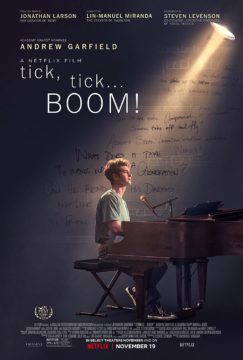by Alexander C. Kafka
 Tick, Tick . . . Boom! is a lively, lovely tribute by one singular Broadway talent, Lin-Manuel Miranda, to another, Jonathan Larson. It also marks Miranda’s impressive debut as a film director.
Tick, Tick . . . Boom! is a lively, lovely tribute by one singular Broadway talent, Lin-Manuel Miranda, to another, Jonathan Larson. It also marks Miranda’s impressive debut as a film director.
Not to get all sappy or anything, but beyond its superb casting and production standards, the movie brims with love. Love for Larson, who died tragically and prematurely from an aortic aneurysm at age 35 the day before the opening of his magnum opus, Rent. But love too for the creative impulse and the artistic life. Folks who hate musicals, who find too many characters nauseatingly self-involved, will not find counterevidence here. But that self-involvement is a plot-driver in Boom!, a trait analyzed and criticized but clearly necessary to the pursuit of a poetic project against all odds and societal pressures.
The film is based on a 1990 solo show — a “rock monologue” — that Larson performed about his experiences with a previous, unproduced musical called Superbia. After Larson’s death, playwright David Auburn revamped Boom! as a three-actor script. In this film version, Steven Levenson frames the story using Larson’s future Rent success. That’s a smart move. It casts Boom! as an origin story of sorts, with the poignant, bittersweet light of laurels to come, but also of fate’s cruel hand. The Tick, Tick … Boom! of a career as the Larson character approaches his 30th birthday is also the emptying of the hourglass of life, and the bomb countdown of a brave, delicate heart on a short biological fuse.
The seize-the-day atmosphere is deepened by the AIDS crisis that has taken so many of the protagonist’s friends in the 1990 setting, and also by strains in his relationship with Susan, his girlfriend, a modern dancer who is weighing a job in the Berkshires at Jacob’s Pillow.
The versatile Andrew Garfield is a revelation as Larson. His singing is robust, he beams with charisma, and his lanky physicality helps him convey Larson’s antsiness, ebullience, and brooding impatience. The mesmerizing Alexandra Shipp, as Susan, makes palpable her understandable frustration with Larson’s self-centeredness. During a fragile moment between them, she catches him trying to translate their troubles into a musical number. Her sharing with the shimmering Vanessa Hudgens of the torch song “Come to Your Senses” is quite devastatingly beautiful. The contrivance of Larson’s having to compose one last number before the big show is goofy, but worth it if only for the anxious and often funny procrastination montages that precede it.
Robin de Jesus is raw and stirring as Jon’s friend Michael, an actor turned advertising executive. He’s also fun in a lighter number with Garfield, “No More,” about moving from gloomily lit, claustrophobic downtown tenement housing to a bright, swank uptown condo building. Of the more than a dozen musical numbers, other highlights include a soul-searching “Louder Than Words,” a surreal “Sunday,” about the nonsensical magic of a weekend brunch at the diner where Larson is a waiter, and “Johnny Can’t Decide,” concerning one of those situational knots where young love can’t be reconciled with young career and life ambitions. (Broadway aficionados have some special treats in store during “Sunday.” Don’t blink.)
Boom!’s story and score aren’t nearly as solid as those of Rent, but Miranda turns those weaknesses into strengths, capturing young artists in their delicate, precarious chrysalis stage. Executive music producer Bill Sherman gives the plucky score great spirit and a crisp, clean, balanced sound. Cinematographer Alice Brooks keeps the lens lively, circling, and intimate, so that the viewer feels part of the crowded apartment parties and like an energetic bystander in the street and nighttime Central Park scenes. Film editors Myron Kerstein and Andrew Weisblum do a great job timing transitions and cuts with the musical phrasing. And the special effects squad brings visual magic to a key swimming-pool scene.
Miranda wonderfully captures the sometimes demeaning theatrical workshop setting — one he clearly knows down to his bones. In one critique session, Bradley Whitford portrays Stephen Sondheim as a living Broadway prophet, and Richard Kind has a great time playing off of him as a spineless, mealy-mouthed, kiss-up colleague.
“Why should we blaze a trail when the well-worn path seems safe and so inviting?” Jonathan and Susan ask in “Louder Than Words.” Larson was blazing his own trail when he wrote those lyrics. He continued wrapping strands from wide-ranging genres around current events in a deeply personal way. Rent should have been the culmination of only the first phase of a long, brilliant career. But Larson’s courage and single-mindedness are inspiring legacies in themselves, and they are celebrated vividly in Miranda’s sweet film.
